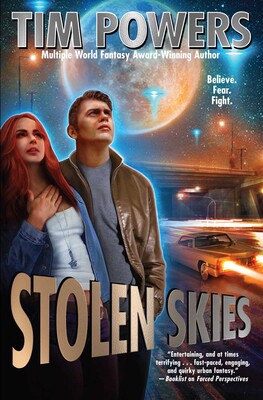

By John Hertz (reprinted from Vanamonde 1506): We’re big on defiance these days in the speculative-fiction community.
Indeed my saying that may provoke a response “What! We are not! I’ll show you —”
Tim Powers in person may not seem particularly defiant. He sports no tattoos, long hair, piercings, sloganized clothing. His manner is mild.
Once we had a lot of science fiction, little fantasy; lately we’ve had a lot of fantasy; so Powers’ writing fantasy does not seem particularly defiant.
His fantasy has generally been — to use a word which may provoke defiance — rigorous. Supernatural phenomena occur, may be predicted, aroused, avoided, as meticulously — a word whose root means fear — as we in our world start an automobile engine or put up an umbrella. Some say this has made his writing distinctive.
His latest, Stolen Skies (January 2022), contains fantasy and science fiction both. This may be defiant. At least when we begin with one we do not expect to find the other. Stories like The Flying Sorcerers (Gerrold & Niven, 1971) where characters think they’re in fantasy but are in science fiction, or Rainbow Mars (Niven, 1999) where characters think they’re in science fiction but are in fantasy, are few.
Any SF authors have to invent their science fiction and fantasy. Science fiction has things not yet made or done but seemingly possible — at the time of writing. From the Earth to the Moon (Verne, 1865) did not retroactively become fantasy when we found the gun barrel would be too short and the acceleration too high. Fantasy has things seemingly impossible — at the time of writing. “Waldo” (Heinlein, 1942) will not retroactively become science fiction if we ever find we too can draw power from an Other World.
How may authors tell us of what we have never known? One way is by tying to what we do know — or at least consider we know. The fantasy in Stolen Skies congrues — there must be a verb for congruent — with recognizable notions in the universe of discourse. The science congrues with astronomy and physics. Astronomy? Physics? I told you there was science fiction.
What about aliens? Outside SF we’re so far not sure we’ve met any. Dolphins, maybe. Ghosts. Or the remark attributed to Leo Szilard (1898-1964), We ARE among you. We call ourselves Hungarians. In SF we’ve met some strange aliens. I’ve mentioned Niven’s stories. What if we met really strange aliens? Humpty Dumpty says to Alice, “’Your face is the same as everybody has — the two eyes, so’ (marking their places in the air with his thumb) `nose in the middle, mouth under”‘ (Through the Looking-Glass ch. 6; Carroll, 1865). Never mind the text and the Tenniel illustrations’ showing that’s his face. Or maybe we should mind. Maybe this illustrates how even superb imaginers feel they’d better set limits. Or how Powers is defiant.
I’m not here to compare Powers with Carroll, Tenniel, Verne, or Niven. But in Stolen Skies there just might be —well, no spoilers.
I’ve called Ordinary people in extraordinary circumstances, or extraordinary people in ordinary circumstances the One-Strange Rule. It’s been attributed to C. S. Lewis. I’ve said Powers does both. See Stolen Skies.
Its two main characters we’ve met before: a man and a woman, Sebastian Vickery — not his real name — and Ingrid Castine. This is our third adventure with them, after Alternate Routes (2018) and Forced Perspectives (2020); neither he nor she is particularly happy about that. There’s no sign they’ve ever been, or will be, romantically involved. Powers is defiant again.
George Orwell said of C.S. Lewis “When one is told that God and the Devil are in conflict one always knows which side will win” (Manchester Evening News 16 Aug 45; P. Davison ed., Compl. Wks. of GO v. 17 p. 250, 1998). Optimism from Orwell! Though some say there are sneaky signs of it in his Nineteen Eighty-four (1949). Perhaps he should have noted Grantland Rice’s saying “For when the One Great Scorer comes to mark against your name, he writes — not that you won or lost — but how you played the game” (“Alumnus Football”, 1908).
I’m not here to say Stolen Skies tells us God and the Devil are in conflict. It doesn’t — like the Book of Esther. There are people hard to sympathize with. Among Powers’ masterly touches, he shows of them too how they think they’re right. And then there are — well, I said no spoilers.
Discover more from File 770
Subscribe to get the latest posts to your email.

I find myself intrigued. Congratulations to both Mr Powers and you, Mike.
I’m well behind on Tim Powers fiction. Thanks for the reminder, and nice to see John Hertz pop up here again.
The proper phrase would be ‘in congruence with’, I believe. We should remember that while power drawn from unseen sources the WAY Waldo did it is fantasy, we have our own versions of it (from batteries to electrical outlets) that are similar in appearance. And Heinlein got a patent for waldos that paid him cold, hard cash in licensing rights out of that fantasy story, as well as a check for the story itself + royalties. Facts, not fantasy.
Funny, but I was just talking to a guy last night (on the net) about Heinlein, and “Waldo” in particular.
As for Powers: I am behind, but I bow to none in my admiration for him. Each time he does something we thought we knew he shows us that we didn’t know it at all.
A truly wonderful writer.
Like Heinlein, even when he is not at the top of his game he is still so far above the rest of the pack that he still comes in a ‘best.’